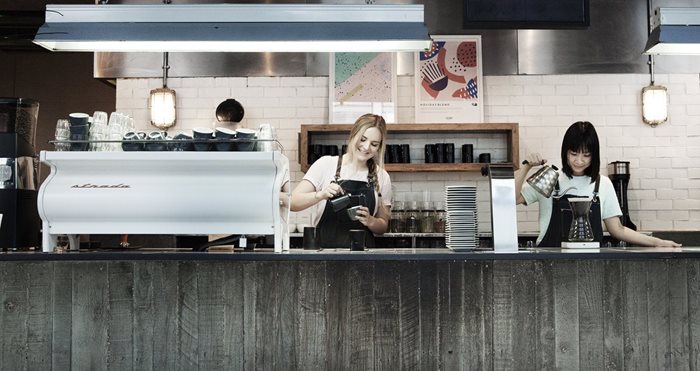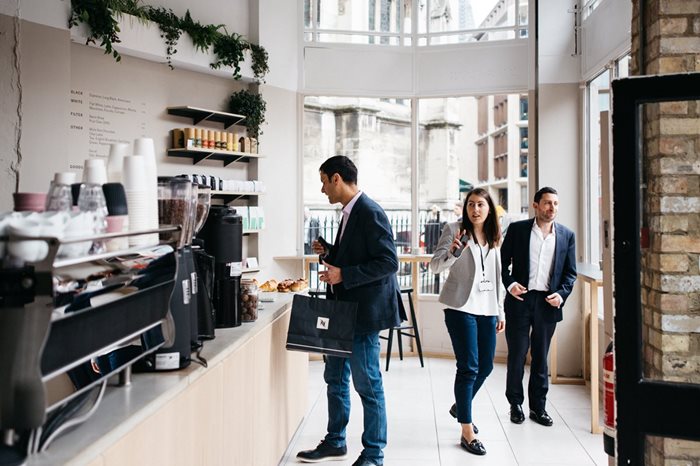We speak to four of London’s key independent coffee shops to find out what inspired their businesses and how they stay relevant in the capital’s highly competitive coffee shop market
.jpg.aspx?lang=en-GB&width=700&height=466)
Climpson and Sons began life as a wholesale roaster in 2002 and opened its revered East London coffee shop in 2005
It’s hard to imagine a time when specialty hallmarks such as single origin and pour-overs weren’t widespread on the UK high street. Today, even relatively niche beverages, such as cold brew and cascara are becoming part of the nation’s coffee lexicon.
The remarkable development in UK coffee is, in part, down to the complex symbiosis between branded chains and independent coffee shops. Twenty years ago, Allegra recorded the total UK coffee shop market numbered just over 6,000 stores, with the branded chain segment totalling just 778 outlets and the UK’s 4,000 independents comprising a whopping 68% of the market.
Allegra estimates UK independents serve more than 10.5 million cups of coffee each week
Fast-forward to 2018, and the number of coffee shops has swelled to more than 25,400 outlets, but the UK’s 7,000+ independents comprise just 28% of the market. Independents may have steadily decreased as a proportion of the UK market over the last 20 years, but the segment still punches above its weight when it comes to market innovation. In fact, growth in independent cafés is perceived as the second most important UK consumer trend by industry leaders surveyed by Allegra, just ahead of increasingly knowledgeable consumers.
Trading on eminence
Allegra estimates that UK independents serve more than 10.5 million cups of coffee each week. But with branded chains often competing on location, convenience and price, independents need to ensure their proposition is pitch-perfect every time.
While independents can’t compete as effectively on price or convenience, many of today’s successful businesses trade on highly refined coffee and service. Founded as a wholesale business in 2002, renowned café and roaster, Climpson & Sons opened on Broadway Market in 2005. Back then, Executive Director, Danny Davies, says he was focused on refining his coffee proposition where others were inconsistent. “A lot of the industry was still in the stages of poorly maintained equipment and multiple origin coffee blends. We decided to take that up a notch with attention to detail; latte art, really good espresso,” he says.
“A lot of the industry was still in the stages of poorly maintained equipment and multiple origin coffee blends. We decided to take that up a notch"
Danny Davies – Executive Director, Climpson & Sons
Fellow café innovator, Peter Dore-Smith is Founder and Director of Kaffeine. Opening in 2009 and operating two London sites, today the business continues to push the envelope on quality and customer centricity as one of the UK’s most highly regarded coffee shops. “Our entire concept is based on people being indulged and looked after. We do that by making specialty coffee, but also great food made on site and friendly, proficient service. That was lacking in the early 2000s – it’s better now, but it’s always been our point of difference,” says Dore-Smith.
.jpg.aspx?lang=en-GB&width=700&height=466)
First opening in 2009, Kaffeine's two London stores continue to push the envelope on quality and customer service
The changing face of high street coffee
There’s no doubt the coffee shop market is among the most resilient in the UK, posting two-decades of continuous growth since 1999. But with rising labour costs, property costs and business rates all squeezing margins, independent cafés are particularly susceptible to price increases and weakened footfall, especially in today’s challenging retail environment. Nevertheless, 80% of independent coffee shop leaders surveyed by Allegra in March 2019 reported positive sales performance in the last 12 months, with the majority citing coffee and service quality as key success factors. “You used to be able to open a store on a shoe-string, but you wouldn’t get away with that now, London is a tough market,” says Kaffeine’s Dore-Smith. “People didn’t used to have such high expectations,” he adds.
“You used to be able to open a store on a shoe-string, but you wouldn’t get away with that now"
Peter Dore-Smith – Founder and Director, Kaffeine
Founded in New Plymouth, New Zealand in 1998, Ozone Coffee Roasters is another highly influential independent roaster and coffee shop firmly on the pulse of the UK coffee development. COO and Co-Owner Lizzie Gurr travelled to London with her husband in 2010 and opened the business in 2012. She agrees that in a tough retail, environment, the success of the UK’s independents hinges on exploring new avenues for quality and continually raising standards. “I definitely see opportunity for better cups of coffee being served in better store environments. But specialty coffee in isolation can be very tricky to execute in a commercially sustainable way, particularly in London and in the current economic climate.”
"Specialty coffee in isolation can be very tricky to execute in a commercially sustainable way, particularly in London and in the current economic climate”
Lizzie Gurr – COO and Co-Owner, Ozone Coffee Roasters
As London’s coffee shop market has gone from relative obscurity to global acclaim, consumers have certainly had their fill of new café concepts. While introducing further complexity could appear tempting, getting the fundamentals right is still essential, and it’s not easy to achieve. One such newcomer is Rosslyn. Opening in London’s City to widespread praise in 2018, founder James Hennebry explains that for his business, the term ‘specialty’ is holistic, encompassing coffee, store environment and staff.
“We spend a lot of time, money and effort with our coffee, but it’s all trumped by the service we provide and the connection we have with customers. You can excuse an average coffee, but you can never excuse bad service.” But more than offering razor-sharp customer experience, Hennebry explains his business aims to stand out from the crowd by creating sustainable careers in coffee and is one of only two cafés in the City of London to be London Living Wage certified.
This close attention across small store portfolios gives independent coffee shops a competitive edge when it comes to customer service and neural loyalty. Allegra research shows just 8% of consumers value loyalty schemes at independent coffee shops, compared to 28% across the total coffee shop market.

Founded in New Zealand more than 20 years ago, Ozone launched in London in 2012 and has become one of the capital's most celebrated roasteries, coffee shop and brunch locations
A different kind of growth
Scaling outlets is the natural progression for many successful cafés, with 5
th Wave operators such as Caravan, Grind and Department of Coffee and Social Affairs all starting out as specialty independents. But many independents are driven by other forms of scalability, such as refining existing operations.
“Doing things properly is a form of scale,” says Climpson’s Davies. "If you’re roasting a few thousand kilos a week, enjoying it and making money, as opposed to being a mess and costing a lot, then you’ve scaled up if you ask me.”
Ozone still trades from its 100-seater store in London’s Old Street but is now in the process of expanding its roasting operation after joining forces with specialty roaster, Hasbean, in 2018. “As well as the new roastery there’s going to be a new retail environment, but we don’t have specific plans at this stage for more stores. Our model has always been built on the roastery and eatery in one building,” explains Gurr.
Kaffeine’s Dore-Smith originally planned to scale his business to ten stores, but says his ambitions pivoted toward the pursuit of excellence as the reputation of his two sites grew. “We were awarded Best Independent Coffee Shop in Europe by Allegra in 2010 and while I don’t plan to expand to ten stores anymore, it’s still my goal to be one of the best coffee shops in the UK,” he says.

All about the service: Rosslyn opened in 2018 and rapidly gained a reputation for excellence and its holistic approach to the specialty coffee shop experience
Co-existing with branded chains
As testbeds of innovation, independents can be nimbler than scaled competitors, assimilating new products and equipment rapidly and for short times without disrupting systems or branding. This is evident in the role UK independents have played introducing new products, such as cold brew and single origin, which have subsequently been popularised by scaled chains. But this dynamic can also work in reverse, with branded chain consumers gravitating toward specialised propositions at independent coffee shops as their knowledge grows.
“UK consumers have become a lot more concerned about the coffee they drink, and chains have been a part of that"
James Hennebry – Founder, Rosslyn
“UK consumers have become a lot more concerned about the coffee they drink, and chains have been a part of that. You’re not going to jump from instant coffee to a honey processed V60 pour over, there has to be a progression,” says Rosslyn’s Hennebry.
Another area where branded chains and independents can act in step is sustainability. Though the waste footprint of independents is inevitably smaller than branded chains, larger enterprises can harness their scale to instigate sea changes in consumer habits. The UK’s major chains all offer incentives for reusable cup usage in-store, while Costa Coffee is aiming to recycle 500 million takeaway cups by 2020 as part of an industry-wide recycling scheme.
Some UK coffee shops have even opted to ban takeaway cups completely, an effective yet problematic solution to waste. In April 2019, 20-store chain Boston Tea Party revealed that banning paper cups had resulted in a £250k sales decline.
“We’ve explored completely eradicating takeaway cups, but that has a lot of associated challenges - the main one is consumer habits,” says Ozone’s Gurr. We need the influential power of chains and local government to set a precedent because it’s difficult to change consumer behaviour as an independent.”
Climpson’s Davies agrees that larger companies can utilise scale to champion ethical issues in the wider coffee industry. “Large chains have so much buying power; they can really impact on the green coffee market and help improve livelihoods,” he says.
And although independents may appear outgunned by larger rivals, nearly 60% of independent café owners surveyed by Allegra indicate branded chains have a neutral impact on their business, with 17% stating a positive effect.
“Our store shares a building with a major coffee chain, which is a very visual way of looking at the UK coffee shop market. We do things differently, it’s not right or wrong, it’s just a different part of the market,” says Rosslyn’s Hennebry.
As for the future, the UK high street climate may be tough for independents, but this group of innovators is still at the vanguard of promoting coffee appreciation among consumers. One thing’s for sure, with more consumers than ever willing to grow their coffee knowledge at an independent, those that can deliver a seamless, tailored café experience based on quality, community and inclusivity look set to thrive in the UK’s next era of coffee shop development.

 The Rise of Independents UK 2019 is World Coffee Portal's first focused report the UK's innovative, diverse and competitive independent coffee shop segment. The research identifies market growth and size, with a critical focus on major trends, key opportunities and potential barriers to growth. The report also provides in-depth profiles for some of the key independent segment influencers, with typical pricing data, industry insight and consumer analysis.
The Rise of Independents UK 2019 is World Coffee Portal's first focused report the UK's innovative, diverse and competitive independent coffee shop segment. The research identifies market growth and size, with a critical focus on major trends, key opportunities and potential barriers to growth. The report also provides in-depth profiles for some of the key independent segment influencers, with typical pricing data, industry insight and consumer analysis.